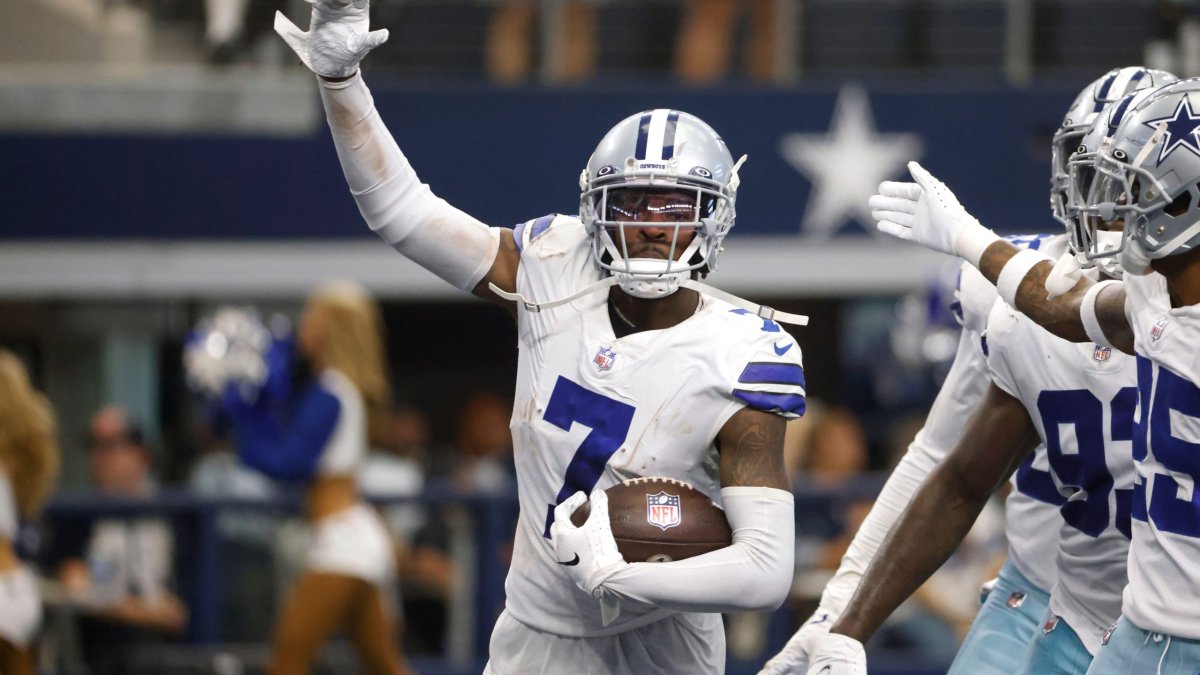• Dallas Cowboys cornerback Trevon Diggs signed a five-year, $97 million extension on Tuesday.
• Team-friendly contract: Even though he's 24 years old and already earned a first-team All-Pro nomination in addition to Pro Bowl nods, Diggs' new per-year salary ranks only fifth among cornerbacks.
• Ever-improving skill set: Diggs' year-over-year growth should give Cowboys' fans optimism about the extension.
Estimated Reading Time: 5 minutes
Just as the Dallas Cowboys‘ 2023 training camp in Oxnard, California, kicked off, the team announced that it signed star cornerback Trevon Diggs to a five-year, $97 million extension Tuesday.
Given that Diggs will be earning $19.4 million per year on average — a figure that currently stands fifth among NFL cornerbacks — this contract should be considered a win for the Cowboys' front office. In a league where the highest-paid player at a position is a function of timing instead of an indicator of which players are actually the best, the fact that Diggs' per-year salary comes in behind four other cornerbacks should be considered team-friendly, especially given that Diggs already has a first-team All-Pro nomination and two Pro Bowl nods on his resume despite being just 24 years old.
PFF's cap expert Brad Spielberger agrees, noting “The fully guaranteed at signing ($33.3 million; 10th) and total guarantee number ($42.3 million; sixth) trail the top contracts at the position by a decent margin, as does the three-year cash flow of $55.5 million, which ranks seventh at the position and behind Tre'Davious White and Xavien Howard.”
Now, the more astute observers may be confused that a PFF employee would be a fan of a team signing a cornerback whose coverage grade ranks in the 57th percentile at his position since entering the NFL to a top-five salary at the position. Therefore, it's important to note that PFF coverage grades are not a stable measure on their own (though they become a bit more useful when projecting year to year), so incorporating film study and a variety of other metrics helps paint a clearer picture of a player's ability and impact on his defense.
For example, one aspect of Diggs' game (and the Cowboys' overall defensive scheme, in general) that suppresses his coverage grade is that he gives up a lot of “cheap” yardage when playing “soft” coverage (which we are going to limit to deep-third responsibility in Cover 3 or deep-quarter responsibility in Cover 4 for the purposes of this article).
In 2022 (including plays nullified by penalty), Diggs allowed 14 receptions for 241 yards (which represents around 32% of what he allowed all season in coverage); however, 13 of those receptions came on passes underneath his soft coverage (such as intermediate stop routes, slants and out routes). These are the types of receptions allowed that should almost be credited against the scheme rather than an individual. And even if you do blame it on Diggs, defenses will live with it, especially given that Diggs does such a good job taking away the vertical passing game.
Trevon Diggs does a phenomenal job staying on top the receiver and feeling his route while his eyes are on the QB due to a zone turn. Once the ball is in the air, Diggs plays like an All-Pro WR and converts the INT. #Cowboys pic.twitter.com/13OuyBAi5q
— John Owning (@JohnOwning) October 4, 2022
Since 2021, the 6-foot-2 and 195-pounder ranks ninth among cornerbacks in coverage grade (82.9) on 20-plus-yard passes after allowing just 11 receptions for three touchdowns, in addition to coming away with six interceptions and 10 forced incompletions on 32 targets. Impressively, Diggs' forced incompletion rate (31.3%) on 20-plus-yard passes stands just behind his completion rate allowed (34.4%) in the same situation.
Trevon Diggs's hangtime on some of his PBUs is so damn impressive. Looks like he's floating #Cowboys pic.twitter.com/Lapj1bMMHh
— John Owning (@JohnOwning) September 16, 2022
So while many would advocate that Diggs provide tighter coverage on short-to-intermediate throws even when he has “soft” coverage responsibilities, it would likely come at the detriment of his ability to defend the deep ball. He may be grading poorly due, in part, to allowing a lot of “cheap” production, but the grades don't take into account how Diggs' style of play enables him to be so effective against the deep ball, which is a more valuable and important skill to the Cowboys' defense.
Even though Keenan Allen wins the battle at the LOS, Trevon Diggs wins the war with an absurd INT, showing impressive acceleration to recover & ball skills to secure the pick.
Easy to see why TD creates so many TO opportunities, as he turns eyes to the QB when gets back in-phase pic.twitter.com/5GjDjadGg2
— John Owning (@JohnOwning) July 22, 2022
Diggs is an invaluable piece to the Dallas unit, first and foremost, because of his ability to create turnovers. Over the past two seasons (including playoffs), Diggs leads the league in interceptions (14) by a wide margin (next closest is Rasul Douglas' nine). The Alabama product's receiving background shines bright in this respect, as he displays a keen awareness for route depth and timing, in addition to a rare ability to finish at the catch point, even if contact is present.
Moreover, Diggs' year-over-year improvement should make even the most hardened Cowboys fans optimistic about his extension, as it portrays a player who hasn't even come close to hitting his ceiling as a defender. It's important to note that Diggs didn't start playing cornerback until his sophomore year at Alabama in 2016, so it makes sense that his growth curve would be steeper than most entering the NFL. And that growth has had tangible effects on his production already — among cornerbacks with at least 300 snaps in coverage, Diggs went from 66th in 2021 to 16th in 2022 in targets allowed per coverage snap and 89th to 15th in yards allowed at the catch point per snap.
One of the biggest improvements that belied those statistical improvements was Diggs' fine-tuning of when and where to take risks in coverage. In 2021, he was ultra-aggressive in his pursuit of interceptions, which is why he led the league in that facet. But it was a double-edged sword because he was repeatedly taken advantage of with double moves and misdirection, which is why he was the only cornerback in the NFL who allowed more than 1,000 yards that season.
Nonetheless, Diggs picked his spots better in 2022, so even though his interception total came back down to earth a bit, Diggs was also much more consistent, which enabled him to cut his passing yardage allowed by more than 300 yards (though, as we mentioned earlier, Diggs' performance with “soft” coverage roles plays a big reason in why he still allowed more than 700 yards last season).
Given that Diggs has one of the two or three best NFL resumes in terms of accolades (one first-team All-Pro and two Pro Bowl nominations in three seasons) among sub-25-year-old cornerbacks, in addition to his ability to improve year over year, his extension should bring a smile to Cowboys fans' faces across the country.



 © 2026 PFF - all rights reserved.
© 2026 PFF - all rights reserved.